
Date: 3 January 2021
Author: lecridespeuples
Interview with Hezbollah Secretary General Sayed Hassan Nasrallah devoted to Hajj Qassem Soleimani, Commander of the al-Quds Force (whose ultimate goal is the Liberation of Jerusalem) of the Revolutionary Guards, on the occasion of the 40th day after his death, February 13, 2020.
January 3, 2021 commemorates the 1st anniversary of the assassinations of Qassem Soleimani and Abu Mahdi al-Muhandis. On this occasion, we are translating a few excerpts from this 2-hours long interview.
Source: https://video.moqawama.org/details.php?cid=1&linkid=2099
Translation: resistancenews.org
Transcript:
Journalist: […] You mentioned on several occasions the concept “School of Hajj Qassem Soleimani”. His Eminence the Guide (Khamenei) also referred to it. What meaning do you give to this concept? Can you explain it to us? What does the concept “School of Hajj Qassem” mean?
Hassan Nasrallah: Of course, this concept originated from the Way of Imam Khomeini, may God be pleased with him, from the School of Imam Khomeini. But we can say that in practice and in the field, in all the responsibilities that Hajj Qassem has assumed and everything he has endured, we can speak of a Way, in the sense —and it may be something deliberate— of a certain thought, of a set of thoughts, of a particular culture, of a specific way of doing things… I will give you some examples. Of course, we are talking about an issue that deserves (in-depth) thought and study, but I will give a few quick illustrations.
For example, Hajj Qassem is the leader of a force of the (Revolutionary) Guards [he says it in Persian]. He could stay in Iran, in Tehran, and tell others (Resistance Axis forces) to come to him regularly for a meeting, so that he can listen to them, and follow their affairs (from a distance) in a simple and routinely fashion. Or, if he visited them, whether in Lebanon, Syria, Iraq or elsewhere, he could for example (only do it) once every 6 months or once a year, he could just visit them once in a while to find out and inquire. In general, this is the way some (high-ranking) leaders act.
The Path of Hajj Qassem is to go to the field of action, to the battlefield, to (constantly) go himself to others. Since 1998 (year in which Soleimani became the leader of the Al-Quds Forces), since our knowledge and our relationship with Hajj Qassem began, that is to say for twenty years, 21 or 22 years, the number of times we have been to him (in Iran) is very limited. But for his part, he always came to us, very often. Of course, the very fact of coming to the field, to the battlefield, to meet the (Hezbollah) brothers here, to meet them all, to go directly to the field, to hear (directly) from the fighters and Mujahedeen, this has enormous benefits and advantages in terms of leadership and administration.
Date: 3 January 2021Author: lecridespeuples0 Comments
Interview with Hezbollah Secretary General Sayed Hassan Nasrallah devoted to Hajj Qassem Soleimani, Commander of the al-Quds Force (whose ultimate goal is the Liberation of Jerusalem) of the Revolutionary Guards, on the occasion of the 40th day after his death, February 13, 2020.
January 3, 2021 commemorates the 1st anniversary of the assassinations of Qassem Soleimani and Abu Mahdi al-Muhandis. On this occasion, we are translating a few excerpts from this 2-hours long interview.
Source: https://video.moqawama.org/details.php?cid=1&linkid=2099
Translation: resistancenews.org
Transcript:
Journalist: […] You mentioned on several occasions the concept “School of Hajj Qassem Soleimani”. His Eminence the Guide (Khamenei) also referred to it. What meaning do you give to this concept? Can you explain it to us? What does the concept “School of Hajj Qassem” mean?
Hassan Nasrallah: Of course, this concept originated from the Way of Imam Khomeini, may God be pleased with him, from the School of Imam Khomeini. But we can say that in practice and in the field, in all the responsibilities that Hajj Qassem has assumed and everything he has endured, we can speak of a Way, in the sense —and it may be something deliberate— of a certain thought, of a set of thoughts, of a particular culture, of a specific way of doing things… I will give you some examples. Of course, we are talking about an issue that deserves (in-depth) thought and study, but I will give a few quick illustrations.
For example, Hajj Qassem is the leader of a force of the (Revolutionary) Guards [he says it in Persian]. He could stay in Iran, in Tehran, and tell others (Resistance Axis forces) to come to him regularly for a meeting, so that he can listen to them, and follow their affairs (from a distance) in a simple and routinely fashion. Or, if he visited them, whether in Lebanon, Syria, Iraq or elsewhere, he could for example (only do it) once every 6 months or once a year, he could just visit them once in a while to find out and inquire. In general, this is the way some (high-ranking) leaders act.
The Path of Hajj Qassem is to go to the field of action, to the battlefield, to (constantly) go himself to others. Since 1998 (year in which Soleimani became the leader of the Al-Quds Forces), since our knowledge and our relationship with Hajj Qassem began, that is to say for twenty years, 21 or 22 years, the number of times we have been to him (in Iran) is very limited. But for his part, he always came to us, very often. Of course, the very fact of coming to the field, to the battlefield, to meet the (Hezbollah) brothers here, to meet them all, to go directly to the field, to hear (directly) from the fighters and Mujahedeen, this has enormous benefits and advantages in terms of leadership and administration.
First, it strengthens these fighters (by giving them morale), and expresses the respect and affection he has for them. “It is I who always come to you, I am at your service. Do not bother to come to me in Iran, it is I who come to you.” For those in charge (of Hezbollah or other Resistance movements) on the ground (and for the fighters), (this attitude) has (huge) ethical and moral consequences. Second, it allows him to hear all opinions, all points of view (directly), not just the opinion of the people who would come to him (in Iran) to express their (own) point of view. This helps him to have a clearer, more global and fairer idea (of the reality on the ground). Third, it helps him to access all (hierarchical) levels, right down to the front line fighters, and to hear them talk about their problems, their shortcomings, their needs, their remarks, etc. Fourth, it gives him a deeper, more comprehensive, and broader idea of (all) the battlefileds for which he is responsible. He does not rely (only) on reading the reports written by the (various high-level) officials, no! He goes into the field in person to see with his own eyes, to listen (to first hand information), and to discuss and debate with all levels. This is one of the meanings of the Way of Hajj Qassem. This is an unusual way of doing things, especially with a military general (among the highest ranking in Iran). Certainly, perhaps at the frontlines of the Iran-Iraq war, the great (Iranian) commanders came down to the ground, to the fighters, but it is something specific to Iran that is not done outside of Iran. But this is one aspect (of the Way of Hajj Qassem).
Another aspect is the absence of fatigue and lassitude. (In Iran), you say [Nasrallah cites a phrase in Persian]. He never gets tired. We are all prone to fatigue. Sometimes we feel that things are weighing very heavily on us, we are under great pressure (bordering on the unbearable), but the Hajj would work (tirelessly) for long hours, even when he must have been exhausted. I remember that during one of his visits (to Lebanon) he suffered from a very bad toothache, and (it is well known) that such pain is unbearable. We suggested to bring in a dentist, but he replied, “Not now, after our meeting.” That is, after 6 hours of going through the pain, while leading and attending the meeting, making (crucial) decisions, and only at the very end he would go to the dentist. The capacity for endurance and patience of Hajj Qassem in the face of fatigue and the most severe difficulties is quite exceptional. I have never known anyone, and I am by no means exaggerating, who can endure so much fatigue, straining, lack of sleep, etc., as much as Hajj Qassem.
Another important aspect of his personality is his thoroughness. He was extremely thorough and diligent. He was constantly following (the different files) [Nasrallah illustrates this point with an expression in Persian]. For example, someone can agree (on something) with someone else, then after a week, two or three, inquire about the issue or not, check it or not, but not the Hajj Qassem. From the second or third day, he would inquire about its progress, he would follow (all matters) precisely and insistently. And of course, he didn’t do it in a rushed (and sloppy) way, but in a precise, detailed and responsive way. This is one aspect of the Way of Hajj Qassem.
Journalist: Looks like he always kept the energy of a young man.
Hassan Nasrallah: Maybe another person would think that he will have plenty of time to follow up or inquire about this or that during the coming months, but not Hajj Qassem, (who followed the issues almost day to day). It was very important for him not to waste time. For example, what could be done in five years (for others) had to be completed in one or two years (with him), thanks to his insistence and his diligent follow-up of all matters.
Another aspect of his personality is his great humility. He was extremely humble. And his humility had a great influence. You know that in general soldiers, when in combat, feel strong and powerful, and can show arrogance, haughtiness, pride, etc. Hajj Qassem was a very humble person, even with the common people, the simple people. This is one aspect of his Way. Of course, we must all be humble, but the fact that this commander, with his position and this (enormous responsibility that weighs on him), is so humble with everyone, is something very important.
The Way of Hajj Qassem is that of facing dangers. He always went into the lion’s den, to the front lines, braving death. I didn’t agree with him on this point. I always insisted that he stay in the background, making arrangements for that. But we were all unable to stop him from going to the front lines. He is the man who is always present in the (most) difficult times, the (most) dark days, always putting himself in harm’s way. For example, during the July 2006 war, the 33-day war, he traveled from Tehran to Damascus, then contacted us to tell us that he wanted to come to us, in the southern suburbs of Beirut (Hezbollah stronghold). We replied (incredulously): “How? It’s impossible!” Bridges had been destroyed, roads cut, Israeli warplanes were hitting all targets (real or suspected) and so on. It was a situation of all-out war! It (seemed) impossible to bring him to us, in the southern suburbs of Beirut. But he insisted a lot, telling us that if we didn’t send him a car, he would come on his own. He insisted, and he came to us. And he stayed with us for the whole duration of the war.
See Qassem Soleimani’s Revelations on the 2006 war
Likewise for the events in Syria and Iraq, in the fight against ISIS, our Iraqi brothers also told us that he was always on the front line, walking on the front line. It’s something exceptional. Normally, generals stand back and lead armies or brigades (from the rear), at least in regular armies, with the exception of the Iran-Iraq war which is a special experience.
Anyway, in truth, all that can be said about the Way of Hajj Qassem comes from Imam Khomeini and his school, and from the indications of His Eminence the Guide (Khamenei), may God preserve him, and the experience of the Iran-Iraq war. It was a grandiose experience in terms of its ideological, cultural, spiritual and military consequences. We found this awe-inspiring experience embodied in the personality of Hajj Qassem.
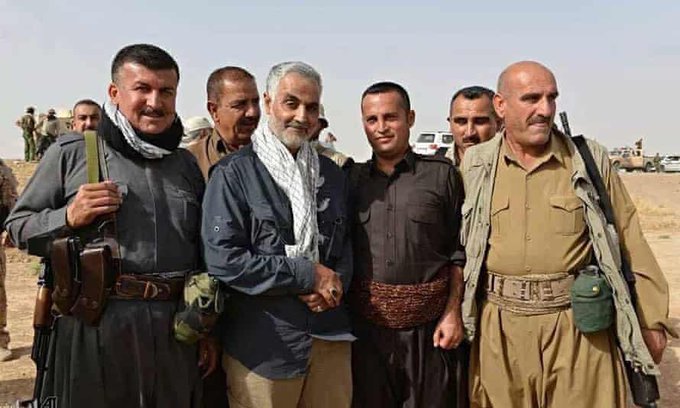
I could say a lot more about the Way of Hajj Qassem Soleimani, but I will content myself with these elements and answer your (other) questions. […]
Journalist: Can you tell us about common memories with him concerning the crisis in Iraq and Syria? What help has he asked from you?
Hassan Nasrallah: So we’re not talking about the latest developments in Iraq, (but) about the emergence of ISIS. When ISIS first appeared in Iraq, and this organization began to take over a number of Iraqi provinces, it turned out that the situation was critical. The Iraqi military was unable to cope with the situation, due (to its dismantling by the American occupier and) to the collapses that occurred. I have heard from several Iraqi officials that many weapons warehouses were empty of ammunition and shells. The moral and psychological situation (was catastrophic).
Hajj Qassem therefore visited Baghdad in person, accompanied by a group of Revolutionary Guard commanders. He made contact with the Iraqi brothers and with the factions of the Resistance with whom he had been in constant contact for a long time. He was the one who went on the field to (launch) the first counterattacks, he went ahead. And the well-known event on the Baghdad-Samarra road took place, in which Hajj Qassem Soleimani and other brothers present with them were nearly killed. A few days after this incident, or at the same time, Grand Ayatollah Sayed Sistani, may God preserve him, issued his famous and historic fatwa (enjoining Iraqis to wage jihad against ISIS), declaring a state of alert and urging the Iraqi people & warring factions to go massively to the front lines. But all this needed organization.
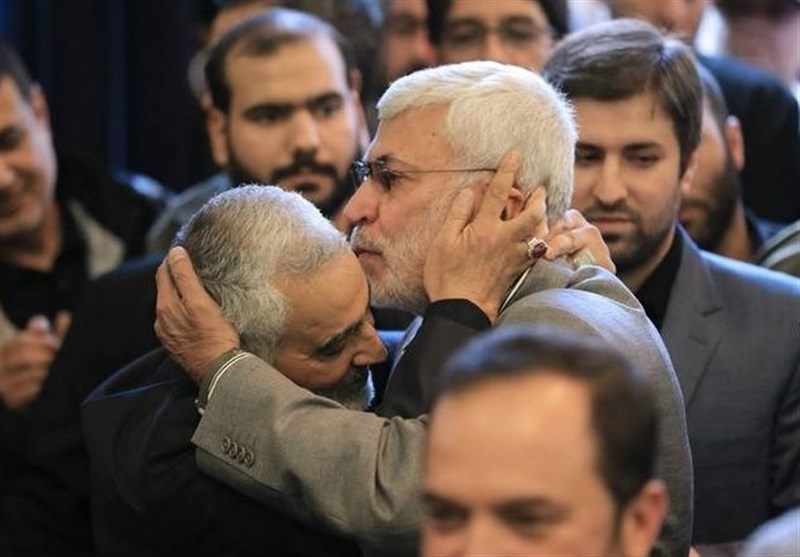
At that time, Hajj Qassem traveled from Baghdad airport to Damascus airport, from where he came (directly) to Beirut, in the southern suburbs. He arrived to me at midnight. I remember very well what he said to me: “At dawn you must have provided me with 120 (Hezbollah) operation commanders.” I replied “But Hajj, it’s midnight, how can I provide you with 120 commanders?” He told me that there was no other solution if we wanted to fight (effectively) against ISIS, to defend the Iraqi people, our holy places (5 of the 12 Imams of Twelver Shiism have their mausoleums in Iraq), our Hawzas (Islamic seminars), and everything that existed in Iraq. There was no choice. “I don’t need fighters. I need operational commanders (to supervise the Iraqi popular forces).” This is why in my speech (commemorating Soleimani’s assassination), I said that during the 22 years or so of our relationship with Hajj Qassem Soleimani, he never asked us for anything. He never asked us for anything, not even for Iran. Yes, he only asked us once, and that was for Iraq, when he asked us for these (120) operations commanders. So he stayed with me, and we started contacting our (Hezbollah) brothers one by one. We were able to bring in nearly 60 operational commanders, including some brothers who were on the front lines in Syria, and whom we sent to Damascus airport (to wait for Soleimani), and others who were in Lebanon, and that we woke up from their sleep and brought in (immediately) from their house as the Hajj said he wanted to take them with him on the plane that would bring him back to Damascus after the dawn prayer. And indeed, after praying the dawn prayer together, they flew to Damascus with him, and Hajj Qassem traveled from Damascus to Baghdad with 50 to 60 Lebanese Hezbollah commanders, with whom he went to the front lines in Iraq. He said he didn’t need fighters, because thank God there were plenty of volunteers in Iraq. But he needed (battle-hardened) commanders to lead these fighters, train them, pass on experience and expertise to them, etc. And he didn’t leave until he took my pledge that within two or three days I would have sent him the remaining 60 commanders.
Of course, that night I felt that in Hajj Qassem’s eyes the whole world was Iraq and the battle that was going on there. In truth, he was completely immersed in this battle, and he regarded it as decisive for the fate of the region. It was not allowed to be neglected. He was ready to be killed there. I told him, “Hajj, the brothers informed me that on the road from Baghdad to Samarra, you were in the convoy (which was attacked), and it is very dangerous.” He replied that he had no other choice, and that he had to move forward for others to move forward as well. “Time is running out, and we only have a tiny window to step in,” he told me. Now was not the time for caution and balance, but we had to give everything we had (in this battle). He was very moved by what was going on in Iraq and ready to be killed there 1000 times in order to save the Iraqi people, the holy mausoleums, the Hawzas, and to remove this danger from Iraq, the Islamic Republic and all the region. We all know that if ISIS had succeeded in seizing Iraq, it would have threatened Iran and the whole region. But those who would have paid the greatest price for the ISIS project are the Iraqis, the Iraqi people in the first place.
Journalist: When did you meet Hajj Abu Mahdi (al-Muhandis, assassinated with Soleimani)? When did you first meet him? Can you recall any memories of this meeting?
Hassan Nasrallah: I got to know Hajj Abu Mahdi in the early 1990s, around 1991-1992. I did not know him before that date, as he was then in Kuwait. Then I got to know him, and the first time I met him was in Tehran. He was one of the main commanders of the Badr Brigades [Iraqi troops who fought against Saddam in the war against Iran], which later became the Badr Organization. Quickly, a relationship of affection, friendship and respect developed between us. He also had good relations with our brothers in Lebanon, with Brother (Sayed Badreddine) Zulfiqar in particular (Hezbollah commander killed in Syria in 2016), with Hajj Imad Moghniyeh and the other brothers. And subsequently, this relationship developed after Hajj Qassem became the commander of the al-Quds Forces. From his position (of responsibility) in Iraq, Abu Mahdi’s relationship with Hajj Qassem (developed), as well as ours in Lebanon, which increased the ties we had with Abu Mahdi.
But our relationship with Abu Mahdi has truly strengthened in recent years, due to the events in Iraq and the fight against ISIS which has seen many Hezbollah members travel to Iraq to help the Hachd al-Cha’bi (Popular Mobilization Units) and Resistance factions. Our brothers were in constant contact with Hajj Abu Mahdi, who came to Lebanon several times to meet me. Only 3 months before his martyrdom, he was here in Lebanon. Once he even came with his family. During our last meeting several months ago, we talked for hours, discussing the situation in Iraq, assessing the security and military issues, how to strengthen Hachd al-Cha’bi as a genuine defender of the Iraqi people, etc. And because of the strength of our brotherhood, he said to me: “Militarily, ISIS is defeated, and there remains only a few isolated cells that will be (quickly) eliminated with the grace of God. But I fear to be still alive when the battle against ISIS is (truly) over.” And he put his hand on his beard, saying, “My beard is gray, and so is my hair, and after all these long years (of struggle), I really fear dying in my bed. I therefore urge you to pray to God the Most High and Exalted to grant me martyrdom.”
Naturally, in accordance with the edicts of His Eminence the Guide (Khamenei), may God preserve him, when someone asks the Guide to pray for him to obtain martyrdom, he is not asking God to hasten his martyrdom, but asks Him to grant him to ultimately die as a martyr. And he sometimes jokes, “I hope you’re over 80 (when God grants you martyrdom)!” The important thing is that we die a martyr, (but as late as possible). This is what I replied to Abu Mahdi, namely that I would not invoke God to hasten his martyrdom, but for his death to be that of a martyr, and I asked him to pray to God so that He grants us the same fate (martyrdom) as well. This happened during our last meeting.
I also want to say that our (intimate) knowledge of Abu Mahdi allows us to say that he was a very sincere, very loyal, very pious man. He had a high sense of responsibility, and he was a Mujaheed in the truest sense of the word. And glory to God, he has many points in common with Hajj Qassem Soleimani. And that is one of the reasons for the exceptional relationship between them.
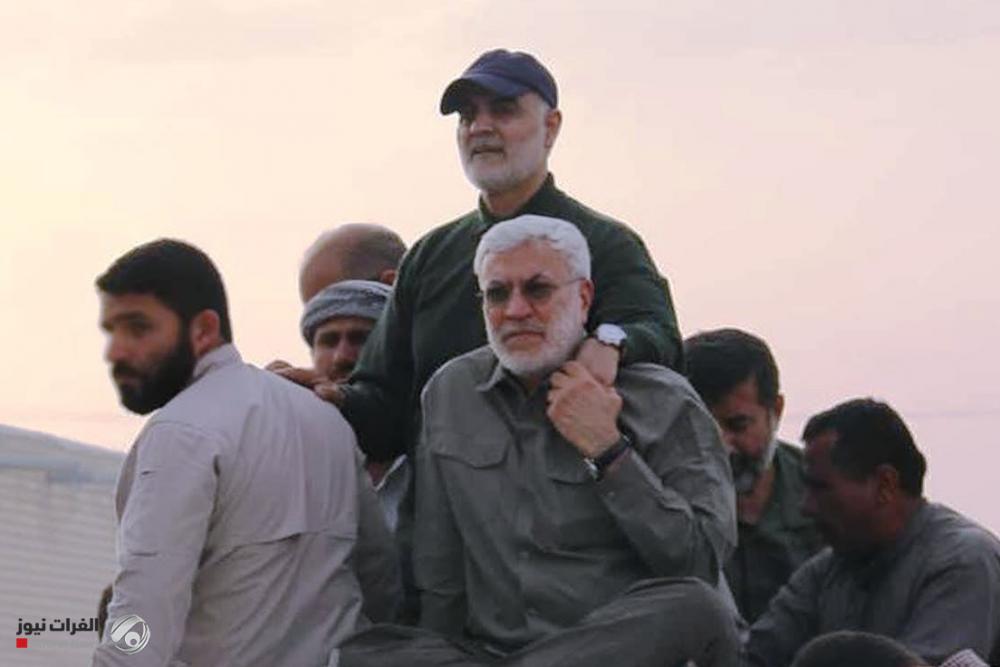
Journalist: The war in Iraq forced Hajj Qassem to be more present on the battlefield. In truth, he was going to all the sensitive places on the front lines. And we’ve seen him a number of times during (dangerous) reconnaissance and other operations. Weren’t these conditions a great risk for his life? He would appear by surprise in the midst of the fighting. Why?
Hassan Nasrallah: He was always in danger, in great danger. On the front lines and on the battlefields he visited in Iraq and also in Syria, he was in constant danger. And he refused to be present only in the rear. He was going to the front line, and wanted to see things with his own eyes to assess the situation directly and first hand, and interact with the fighters on the front line. He wanted to meet them and be among them. That was his way. Of course, we blamed him constantly for that.
(It must be understood) that he was not doing this only because he longed for martyrdom. Some said that Hajj Qassem (only) sought martyrdom and sought the opportunity to be killed, and that this explained his presence on the front lines. This is not true, or at least it is not precise. For he also knew that he had a religious obligation, and that he had no right to expose himself to death unnecessarily. No! Hajj Qassem had a vision, which was true to a great extent: he said that this battle in Iraq and Syria required great endurance, great courage, perseverance on the battlefield. This could not be achieved by management from the rear, far from the front lines. The presence of a commander of a level like Hajj Qassem Soleimani’s on the front lines was of utmost importance to ensure this steadfastness of morale, souls and hearts. His very presence on such a front was enough to give enormous strength & morale to the combatants, helping them to stay, to persevere, to endure, despite all the dangers and all the difficulties they faced. Not to mention all the other benefits a commander can get from being as close as possible to field data.
But I consider, and this is what I heard him say when I debated this issue with him, that the moral, psychological and emotional aspect was of the utmost importance to him. And it’s the truth! You can see from the (countless) videos how he behaved with the young (fighters) on the front lines, in the trenches, (and how they reacted) when Hajj Qassem came to them. They embrace him, kiss his hand, cry, hug him, reproach him for coming to them (thus exposing himself to death), etc. This emotional influence is very important. This is why a (real) relationship of love, affection, passion was born and shaped between the fighters and Hajj Qassem Soleimani. This would never have happened if he was managing operations from behind. The cause of this great love for him is his direct & constant presence on the front lines.
Also, when all these videos and photos started showing up in the media and on social media, I told him about it, saying, “O Hajj, this is something very dangerous!” But he wasn’t doing it on purpose. When he went to the front line, he didn’t have cameras with him, but it was the (fighters) present there who filmed him, because as you know, they all have smartphones with which they photographed or filmed the Hajj and posted the images on social media. (When I reproached him for this), he replied “But these young (combatants) are on the front line, ready to sacrifice themselves, risking their lives at every moment. I dare not tell them to put these phones away or forbid them to film me because it puts me in danger.” That’s why he just let them do it. And in truth, the first images and videos of Hajj Qassem to be released were not broadcast by him or by the Al-Quds (Jerusalem) forces, but by the frontline fighters who filmed and photographed his visits and his presence among them and then put the images online. And that’s how these images spread on social media. There was no other choice. Because he would have felt ashamed to forbid these young fighters from filming him on the pretext that it would put him in danger, when they themselves were the most exposed to death. This is the real reason for Hajj Qassem’s presence in the media in recent years, which was by no means a deliberate act.
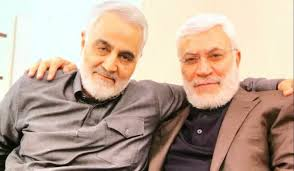
Journalist: After the defeat of the Daeshi and Takfiri project in Iraq and Syria, did you meet Hajj Qassem and Abu Mahdi al-Muhandis together?
Hassan Nasrallah: Yes, the three of us met. This photo [cf. above] was taken in Lebanon in the southern suburbs of Beirut. The brothers made a montage (including all the martyrs killed alongside Soleimani and al-Muhandis), but in the original photo they are sitting on a couch in my office.
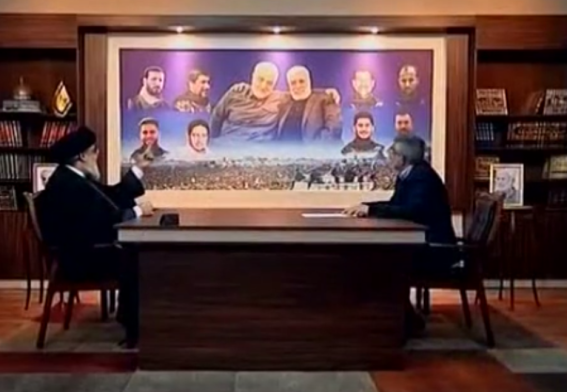
We were together. And there are also pictures of the three of us together, me, Hajj Qassem and Hajj Abu Mahdi.
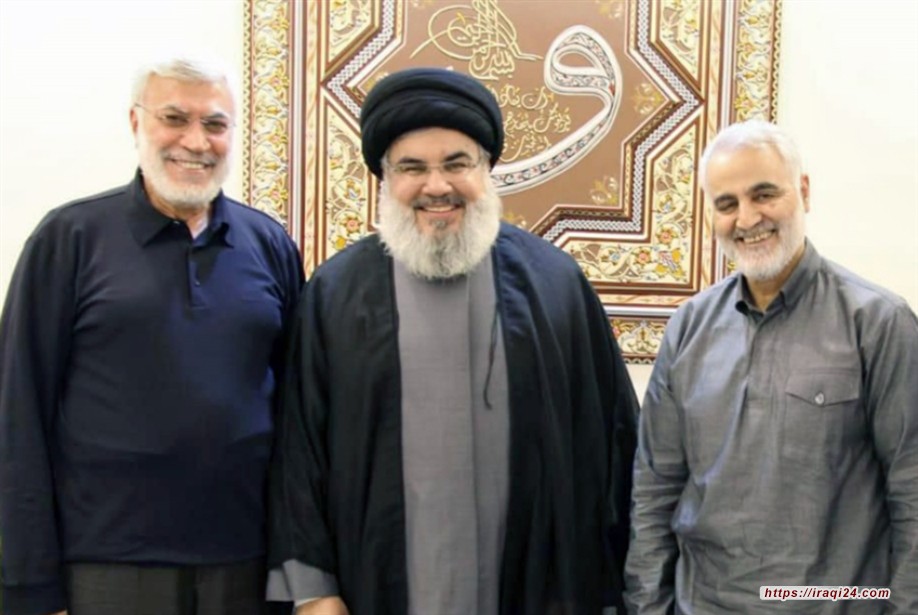
We had a long meeting whose objective was to assess the latest events in Iraq, what we (Hezbollah) could do to help it in the next step, and on the other hand, in case a Israeli war against Lebanon or against the region would be triggered, we discussed what our Iraqi brothers could do to help us fight this war.
Hassan Nasrallah: I consider that one of the greatest blessings that God has bestowed upon me in my life, and His blessings for me were many and great, has been my relation and closeness with Hajj Qassem Soleimani, and this (very strong) friendship and brotherhood between us. What was between us was as strong as if we were really two brothers (from the same mother), whether it was the affection, love, feelings and friendship that bound us.
Likewise, we had the same way of thinking. We thought and saw things the same way, 98% of the time, if not 100%. But even for the 2% of topics where we might have different points of view, one of us could easily convince the other, due to the tremendous trust and love that there was between us.
Of course, on a personal level, the presence of Hajj Qassem was a huge support for me, as I am here on one of the battlefields and confrontations. I always longed for his company, and so did he. And I can tell you and the viewers that for the last 20 years, and especially the last 10 years and more, he’s been one of my closest brothers. If I want to mention a friend who is dear and precious to me, whom I love very much, who occupies a very important place in my heart and whose company I earnestly wish, in whom I have the greatest confidence, and whose presence gives me the most pleasure, I will immediately think of Hajj Qassem Soleimani.
In every person’s life, there are usually two or three people who are considered the closest friends. And as far as I’m concerned, one of them was Hajj Qassem Soleimani. May God have mercy on him.
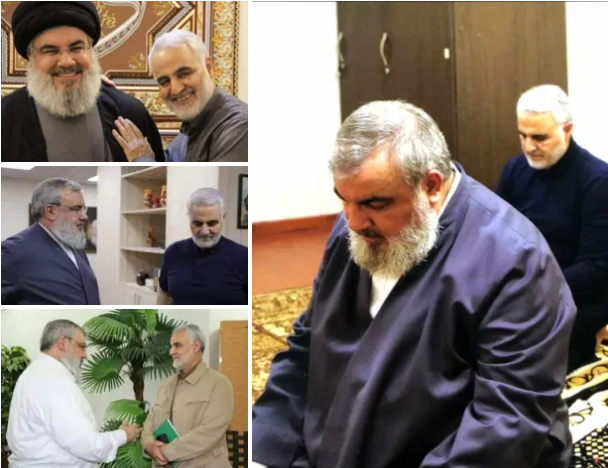
And personally, he knows (what he means to me). One day, I told him. I was always ready to sacrifice my life for him. One day, while we were praying together, after prayer, during invocations (following prayers), the following idea occurred to me: I imagined (this is only a hypothesis) that The Angel of Death came to me, and told me that he was going to Iran to take the soul of Qassem Soleimani. But God had made an exception this time. The Angel of Death told me that God had asked him to come see me first, and offer me an alternative (to the death of Qassem Soleimani). Instead, the Angel could take my soul. (I could die instead and save Soleimani). I wondered what I would have answered to this hypothetical proposition from the Angel of Death. Without any hesitation, I would tell him to take my life, and leave Hajj Qassem Soleimani (alive).
See the Testament of Martyr Major-General Qasem Soleimani
Later, I mentioned this to some (Hezbollah) brothers when we were debating. Because sometimes, due to the overload of work and responsibilities, some arguments can arise between us, and I told them that so that they understand what Hajj Qassem meant in my eyes.
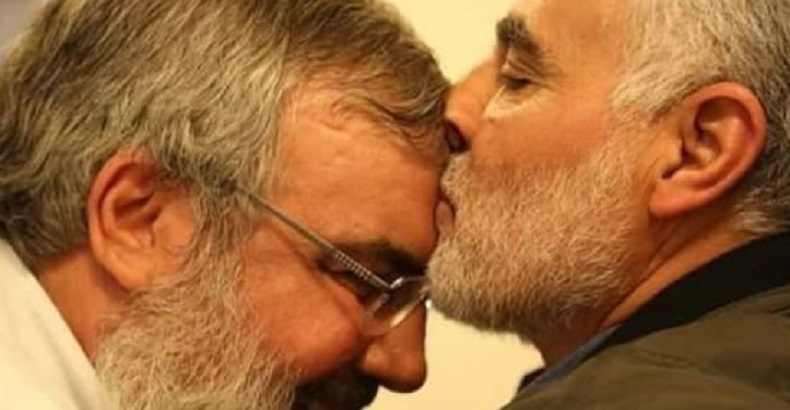
One of the brothers was indignant, asking me how I could think of such a thing (sacrificing myself for Qassem Soleimani). I told him that this was due to two things: first, the immense love and affection I had for him, and the brotherhood that bound us; and second, the fact that I consider his existence to be much more useful to us, to Islam, Muslims, the (Arab-Muslim) Nation and Resistance (Axis) than mine. It is not just affection, but my highest consideration for the importance of this man and his blessed presence.
That’s what he meant to me personally.
Journalist: We thank you very much (for your time). We wish you all the best. With the Grace of God, we will witness the Liberation of Al-Quds (Jerusalem) soon, thanks to your leadership and that of the Supreme Leader of the Islamic Revolution (Khamenei). We wish you and all Resistance fighters health and salvation.
Hassan Nasrallah: May God grant you His blessings. May God preserve you and grant you His blessings. Anyway, I publicly declared and told his family that what happened to Hajj Qassem is the best thing that could have happened to him, and his greatest hope, has happened to him, namely this grandiose martyrdom.
May God have mercy on him.
Donate as little as you can to support this work and subscribe to the Newsletter to get around censorship.
“Any amount counts, because a little money here and there, it’s like drops of water that can become rivers, seas or oceans…”
Related
Filed under: Hezbollah, IRAQ, ISIS, Lebanon, Syria | Tagged: Abu Mahdi al-Muhandis, Nasrallah, PMU, Qassem Suleimani |
Related posts:
Views: 0
 RSS Feed
RSS Feed

















 January 4th, 2021
January 4th, 2021  Awake Goy
Awake Goy  Posted in
Posted in  Tags:
Tags: 
















